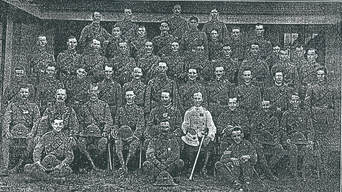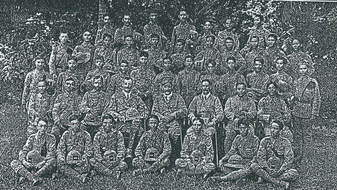Sentry Page Protection
Please Wait...
Extract from The Rangoon Times Christmas Number, 1912
VOLUNTEERING IN BURMA
by
An Officer
VOLUNTEERING IN BURMA
by
An Officer
|
Although Lord Kitchener in his great military reforms of 1905 made considerable provision for the defence of Burma it has always been felt that sufficient consideration was never given to the opportunity afforded by the civil element in the population of the province of obtaining a valuable addition to the Regular Forces. Today there are no more than about 2,000 Volunteers in Burma, to which must be added another 1,000 members of the Railway Service, who are, however, Volunteers almost by compulsion. This makes a total of 3,000 men and there can be no doubt that the number would have been largely increased had a more liberal minded and sagacious policy in regard to the Volunteer Movement been pursued by the local military authorities.
At one time there was much enthusiasm displayed by the various Corps, but this was so damped and cooled by the cynical contemptuousness of headquarters at Maymyo that it is little wonder if the different Corps are not now prospering and that plans of re-construction are in the air. Just as no one expects an equal degree of excellence in the amateur and the professional actor, so it is not to be anticipated that the Volunteers will come up to the same standard of efficiency as the regular Army, but, then, the voluntary citizen soldier is only intended to be an auxiliary whose co-operation in the defence of the country will not be called for save in case of need. At the same time it must be added that the number of efficients in the ranks of the Volunteers in Burma is quite exceptionally high and in the records of their shooting they will bear very favourable comparison with the Regulars. That such a result should be obtained in spite of the official discouragement and cheap sneers meted out to them – often for no better reason than the colour of their faces – is a creditable testimony to the patriotism of the British residents of the Province. There are at the present moment no less than six Corps in Burma – the Burma Railways Volunteers, the Burma Volunteer Rifles, the Moulmein Volunteers, the Rangoon Mounted Rifles, the Port Defence Artillery and the Upper Burma Volunteers. Some of these units are small in numbers, but the percentage of efficiency is high and all the Corps would be able today to show much longer rolls if they were properly handled, adequately financed and protected from army caste prejudice. This last point has, perhaps, proved the greatest hindrance to the spread of the volunteering spirit in Burma. Men who have to earn their living in civil occupations cannot be expected to give up their leisure to a task in which they meet with hardly anything but official ridicule and disdain, are thoughtlessly called out to unnecessary inspections, parades and drills, are expected to bear considerable expense that ought to be borne by Government itself, are asked to act as supplementary police and are constantly subjected to pin-pricks that are derogatory to their own self respect and inimical to military discipline. The fact is that the organisation of a regular regiment is not altogether suited to a volunteer corps and that Generals and other high officers have shown a strange incapacity to realise this. In Burma there exists plenty of good material which only requires intelligent handling, but here, as elsewhere – and indeed in foreign countries – the military authorities have displayed little disposition to recognise that the civil point of view differs very widely from that to which a life of professional soldering has accustomed them. Men occupying responsible positions in large mercantile firms, who accept commissions as Volunteer Officers, cannot reasonably be expected to give up their time to the work of replying to inconsequential head-quarter’s enquiries, or to enter into long written explanations upon points that are of no practical importance. This is what causes unwillingness to accept commissioned rank when elected to it by the members of a Corps and, as in England itself, there is invariably a deficiency of officers who refuse to allow themselves to be turned into mere book-keepers and correspondence clerks and whose military rank is denied recognition in civil life. A larger measure of official consideration could easily be shown which would eventually result in the development of an enhanced amount of interest in, and attention to, the essential features of Volunteering. We cannot create an Army on Western lines in India under present conditions but it is our duty to preserve at the highest standard commensurate with reasonable cost the strength and efficiency of the Volunteers. At the same time there ought not to exist any undue haste for the enlistment of recruits – the Volunteer movement will grow steadily and surely of itself without exposing Burma to the peculiar danger of firearms getting into undesirable hands. New members will always be forth-coming and will be likely to remain in the corps if routine arrangements are sufficiently relaxed to admit of men being treated as citizen soldiers giving voluntary service and not treated as if they were the paid servants of the State, although all Volunteers must never be allowed to forget for a moment that the capitation grant paid for efficiency entitles the State to expect in return an adequate submission to necessary discipline. Soldiering to be of any effective value must be taken seriously and not as a holiday pastime, or as too often occurs in Burma as an excuse for a big drink. (sic) But provided the Volunteer makes himself efficient in drill and musketry, his position ought not to be made irksome by the imposition of parades at inconvenient hours which conflict with his duties as a citizen. The example of the last Boer War proved that he is a force that can render good service to the community, and where mistakes were made on that occasion, they were generally found to be due to incompetent management by regular officers who failed to understand the Volunteer standpoint, and the jealousy of the professional soldier who has never been able to realise, as has also been experienced in Burma, that other people beside himself may know something of the principles of fighting. Having said so much about the treatment of the Volunteers of Burma by the military authorities, a word or two remains to be added about the attitude of the different Corps themselves. Rifle shooting and drill, as has been stated, have never failed to attract, but concurrently there has existed a most regrettable spirit between the various units. The “colour line” has been at the bottom of it, a feature which, however much it is to be deplored, has to be accepted as a condition precedent in the East. The number of Europeans who are at any time available for military service in Burma must always be limited and the constitution of a Corps composed exclusively of white men is a dream – and probably no more than a dream – of the remote future. Yet hard as it is to expect white men to brigade with others of a mixed race and of inferior social positions, there are methods by which the difficulty could be solved if a little good will were displayed upon both sides, accompanied by an absence of tactlessness on the part of the authorities. It is impossible to dragoon Europeans serving as Volunteers into a position which they would not tolerate in social life ; but the spirit of loyalty to the Crown ought to prompt some measure of self sacrifice quite removed from any feeling of condescension. It is unbecoming of a Volunteer to drive to parade in a tum tum. The British Army contains several regiments of coloured troops and in the days of the East India Company there was no discrimination in the ranks and but little social commingling outside of them. A common duty to the Empire demands that a via media be found especially where a glorious common task has been self-imposed. Moreover the records of some of the “coloured” Corps stand very high indeed and enable the latter justly to claim that Volunteering has been taken seriously by them. All men wearing the King’s uniform should be proud to recognise each other and the magnificent cause that beings them together ; but it is a matter that cannot be reformed in force from above – it must find its inspiration from below. |

